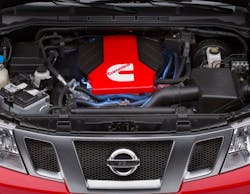Groups highlight diesel tax disparity at Capitol Hill briefing
The Diesel Technology Forum and U.S. Coalition for Advanced Diesel Cars spearheaded a Congressional briefing on Capitol Hill this week to illustrate why the higher fuel tax on diesel is an “unfair burden” on light diesel vehicle owners; one that could also potentially hinder current and future advances in diesel engine technology.
Allen Schaeffer, DTF’s executive director, stressed that the briefing that diesel is now a “clean” fuel with today’s ultra-low sulfur diesel (ULSD) fuel grades and new exhaust control systems reducing the sulfur content of diesel by 97% over the last decade, with particulate matter (PM) and oxides of nitrogen (NOx) emissions falling 98% over the same period.“Clean diesel is not a ‘bridge’ concept or ‘down-the-road’ expectation,” Schaeffer (at left) noted, pointing out that “clean diesel” cars in particular are on the road right now providing “impressive” hybrid-like mileage and meeting the same emissions standards as gasoline vehicles.
He added that clean diesel technology is attracting the “growing interest” from light vehicle manufacturers and consumers alike, with an expectation of diesel market share in the U.S. automotive sector to grow from 3% today to as much as 10% by 2020.
Michael Ruth with engine maker Cummins Inc. highlighted at the event that new light-duty diesel vehicles available today are “clean, efficient and powerful” with 20% to 40% better fuel efficiency than gasoline vehicles, while providing in his words more “responsive power” for a “positive driving experience.”
Ruth said new diesels are clean with many diesels now below the required fleet average required NOx values; thus they can often exceed CAFE or corporate average fuel economy values mandated by the government.He also noted that Cummins continues to work within ATLAS program for light-diesel engine development in conjunction with the U.S. Department of Energy – a program that aims to construct a lightweight 2.8-liter diesel engine that achieves near zero emissions (according to U.S. EPA Tier 2 bin 2 regulations) without sacrificing fuel economy or performance.
Cummins recently showed off a prototype of that engine (above) within Nissan’s "Diesel Runner" mid-sized concept pickup at the 2104 Chicago Auto Show.
Douglas Skorupski of Volkswagen of America, Inc., added that the OEM’s concept XL1 vehicle – a production version of which will be sold in Europe but not the U.S. – can achieve 261 miles per gallon (MPG) by combining a 47 hp TDI clean diesel engine with a 27 hp electric motor and plug in hybrid powertrain.
Yet Jeffrey Breneman, executive director of the U.S. Coalition for Advanced Diesel Cars, said the current federal diesel fuel tax structure “unfairly hurts diesel car and pickup drivers” as it is pegged at 24.4 cents per gallon – some six cents per gallon higher that the 18.4 cents per gallon federal tax on gasoline.
“There are over 7 million diesel cars and light trucks on the road today paying a diesel fuel tax penalty every time they fill up at the pump,” he noted. “There is no policy justification for taxing diesel fuel at a disproportionate rate.”
As a result, Breneman stressed that U.S. transportation and taxation policies should be “technology neutral” and not unfairly favor some fuel types at the expense of others.
About the Author
Sean Kilcarr
Editor in Chief
Sean Kilcarr is a former longtime FleetOwner senior editor who wrote for the publication from 2000 to 2018. He served as editor-in-chief from 2017 to 2018.


